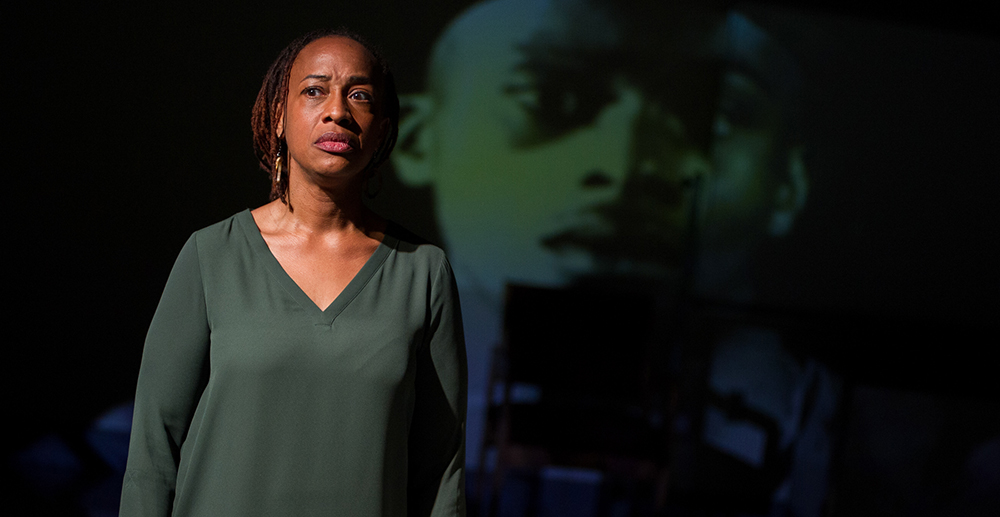Culture
 Andrea Harris Smith as Nya in "Pipeline" // Photo: C. Stanley Photography
Andrea Harris Smith as Nya in "Pipeline" // Photo: C. Stanley Photography
Studio Theatre’s Pipeline Depicts Correlation Between Struggles Past And Present
January 17, 2020 @ 12:00am
In one poignant scene in Dominique Morisseau’s play Pipeline, Nya, a black mom who teaches in a resource-strapped city school, shares the poem We Real Cool with her students. The Gwendolyn Books poem used to be a favorite of hers. But now its message hits a little too close to home.
On another part of the stage, shrouded in darkness, Nya’s son Omari acts out the lines of the poem: “We skip school. We real cool… We jazz June. We die soon.”
It’s the last line that chokes Nya up.
When it was time to send her son to school, Nya chose a predominantly white college prep school, thinking this would give him a brighter future than the decaying urban alternative where she has taught for decades. But now Omari is in trouble. He hit a teacher and ran away. Suddenly, Nya fears she has made the wrong decisions for her son. Or worse: That regardless of her choices as a parent, her son will be caught up in a system that has led generations of black boys to live in America’s shadows.
Pipeline’s title refers to the school-to-prison pipeline many young men of color face in America and the broken education system that feeds into it. Morisseau was inspired to write Pipeline after reading Michelle Alexander’s book The New Jim Crow, which traces racism in America with a direct line from slavery to today’s education inequality and high rates of incarceration for people of color. The play runs through February 16 at Studio’s Mead Theatre.
“Dominique is such a master at taking very big societal issues and harnessing them into characters’ lives, desires, dreams, and truths,” Awoye Timpo says.
Timpo is directing Pipeline at Studio Theatre this month. This is her third time directing a Dominique Morisseau play and it’s this ability to personalize big societal problems through the lens of individual characters that keeps drawing her back to the material.
“What makes Pipeline a great, great play, is that it asks some very big questions about who we are, where we come from, what we aspire to be and what stands in the way of us achieving those things,” Timpo says.
And it does so through the lens of a mother and son whose problems are instantly relatable. In Pipeline, we catch the characters in a deep moment of crisis.
“From the moment we meet Nya, we are watching her try to figure out if her son’s actions are a result of her own personal failure as a mother,” Timpo says. “And the weight of that question is enormous.”
Actor Justin Weaks weighs in on Omari’s struggle.
“This is a young man trying not to be anything but himself, but it’s hard. It’s hard to navigate when you’re operating as a token and feel that from the students, the faculty, everyone. It’s hard to discover who you are when you have so many people telling you what you are or what you should become.”
As Nya and Omari struggle to connect over the course of the play, Morisseau encourages audiences to reconsider the legacy of America’s past.
“If you are trying to save someone, how do you contend with how we got here as you think about how to move forward?” Timpo asks.
“I think what we have to understand when it comes to educating young people,” Weaks adds, “is that these are complicated human beings who have come to be educated. They are dealing with things at home that we may not know about, things that are very specific to that human. Difficult behavior doesn’t come out of nowhere. It has a source and it’s important to understand where these kids are coming from in order to give them the education they need.”
Morisseau is known for incorporating the works of African American artists of previous generations into her plays. Gwendolyn Brook’s We Real Cool is a huge presence in Pipeline, as is Richard Wright’s 1940 novel Native Son, the story of a young black man whose crimes are portrayed as the inevitable outcome of a society that treats black men as criminals. Through these nods to writers of the past, Morisseau weaves their work into her own writing, creating a sense of legacy and reminding us that the struggles of the past are the struggles of the present.
“It’s like she is saying that we have these ancestral spirits who are lurking inside us. The way she lets those writers vibrate in her work is really exciting,” Timpo says.
“We as black artists now are standing on the shoulders of so many generations of artist who have come before us,” she continues. “The beautiful thing about Pipeline is that Dominique is capturing the sights and sounds of this moment in time even as we can feel the presence of other writers inside her work.”
Pipeline runs through February 16 at Studio Theatre. Times and tickets vary by date. For more information abut the play, visit Studio’s website.
Studio Theatre: 1501 1rth St. NW, DC; 202-332-3300; www.studiotheatre.org








